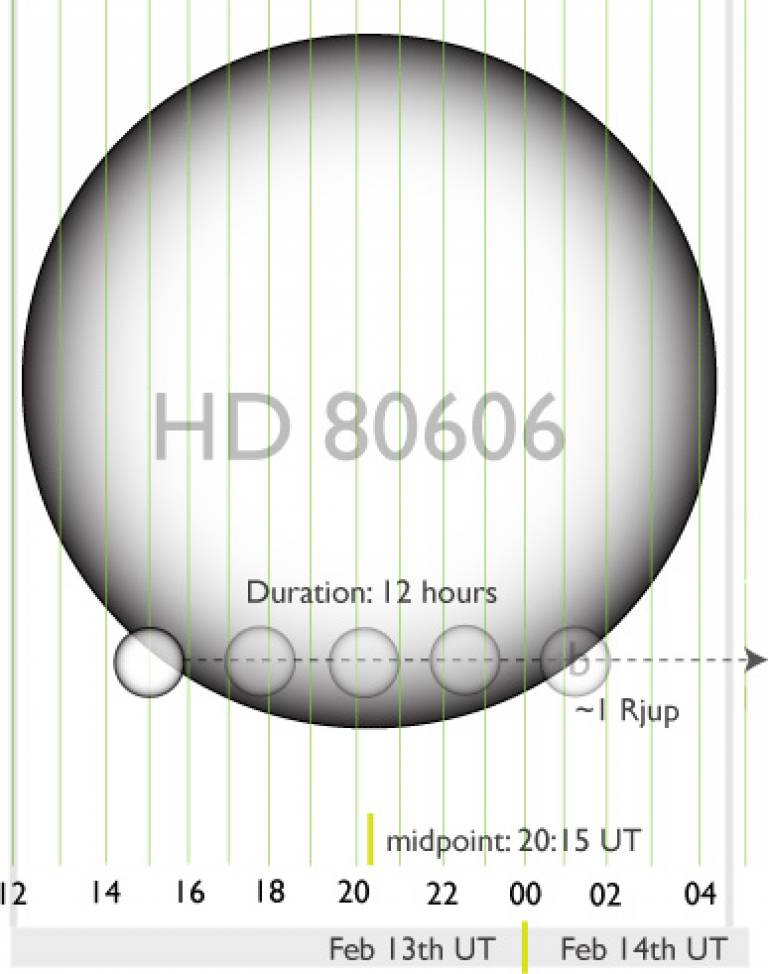UCL students shed light on extrasolar planet
3 March 2009
Links:
 org/abs/0902.4616" target="_self">Article on HD 80606b transit
org/abs/0902.4616" target="_self">Article on HD 80606b transit
A group of undergraduate and postgraduate students from UCL Physics & Astronomy, led by Dr Steve Fossey, have detected the transit of a planet in front of its parent star 200 light years away, using telescopes at UCL's observatory in Mill Hill, the University of London Observatory (ULO). The observation confirmed that the planet is similar in size to Jupiter and one of the densest transiting planets known.
The transit occurred on the night of 13 February 2009 and was observed for ten hours by a team of UCL undergraduates at ULO. The quality of the photometry - the measurements of the intensity of light - is remarkable given that the results were recorded from within London city limits using two of ULO's smaller telescopes.
The observation has provided some of the most precise measurements of the planet's transit yet obtained by astronomers. Preliminary research has been published on a preprint archive and findings have been submitted to the 'Monthly Notices of the Royal Astronomical Society' (MNRAS).
The transit detection presents many opportunities for follow-up observation and modelling of this unusual planetary system using ground- and space-based telescopes. These results confirmed that the planet is similar in size to Jupiter but the planet is four times Jupiter's mass, meaning that it is much denser than the gas planets of the solar system.
The research paper was authored by Dr Steve Fossey, Ingo Waldmann, a fourth-year MSc Natural Sciences student, and David Kipping, a PhD candidate in physics and astronomy. David used a model of the eccentric orbit to perform a precise analysis of the transit.
Dr Fossey commented: "HD 80606b is a planet in the constellation of Ursa Major, and it orbits a Sun-like star about 200 light years away. The planet was first discovered in 2001 and has the longest period for a transiting planet yet discovered - it takes 111 days to complete one full orbit around its parent star. It has an unusual, highly elliptical orbit - similar to that of a comet in our own solar system. The planet swings in a couple of months from a distance similar to that between the Earth and the Sun, to plunge so close to the star as to experience a searing 800-fold increase in irradiation, with dramatic effects on its atmosphere.
"If you could ride above the cloud-tops of this planet, you would see its sun, at close approach, appear about 30 times larger in the sky than our own Sun appears to us. The unusual orbit may be due to the influence of other planets in the same system, or due to the parent star being a member of a binary star system."
UCL undergraduate participation in the transit-monitoring programme at ULO is supported by grants from the UCL Executive Sub Committee on Innovations in Teaching Learning and Assessment (ESCILTA) and the Royal Astronomical Society (RAS).
Image:
The geometry of the transit (courtesy of Greg Laughlin, University of California, Santa Cruz: www.oklo.org)
UCL Context:
UCL Physics & Astronomy
The UCL Physics & Astronomy department has been commended for its teaching activities, winning a London Education Partnership Award (LEPA) in 2008 for its outreach work with local schools. The department won LEPA's Excellent Professional Practice in Curriculum and Student Support in the science, technology, engineering and mathematics category, with a project that involved visits to the University of London Observatory, UCL's teaching observatory at Mill Hill. Led by Dr Steve Fossey, the staff of Physics & Astronomy assisted
A-level and GSCE students from Haringey's Alexandra Park School, a
specialist science and maths school.
ESCILTA
The UCL Executive Sub Committee on Innovations in Teaching, Learning and Assessment (ESCILTA) makes grants to support departmental and faculty initiatives in learning, teaching and/or assessment. The projects supported generally provide a model for development which is replicable in other departments, or which can be promoted to the wider academic community.
 Close
Close

